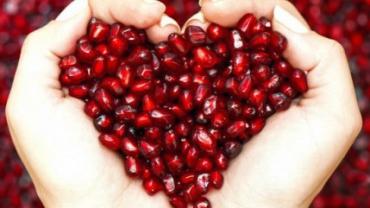
Pomegranates make frequent appearances in religious texts and ancient mythology. They fell quiet for several centuries but recent research uncovering potent health benefits of the fruit juice and leaves has led to the anointing of pomegranate as a modern-day “superfruit” and its resurgence in health food stores and everyday supermarkets alike. You can now purchase bottled pomegranate juice blends pomegranate teas and dried pomegranate arils covered in dark chocolate. Despite their relatively high sugar content pomegranate fruit and juice have impressive properties for ameliorating the deleterious effects of diabetes and metabolic syndrome. And pomegranate’s potential for improving health doesn’t stop there. This fruit may also help reduce oxidative stress inflammation and may even be chemoprotective.
Laboratory assays have determined that pomegranate juice has an antioxidant capacity three times greater than those of green tea and red wine. Researchers noted that juice made from the whole fruit—as opposed to extracts of the arils only—was richer in antioxidants owing in part to a higher presence of punicalagin a tannin found in whole pomegranate. Other studies support this finding: juice made from the whole fruit has up to 20-fold higher antioxidant activity than that made from arils alone.
Pomegranate juice may be considered a “heart healthy” beverage. In hypertensive patients 50ml of pomegranate juice daily for two weeks resulted in a staggering 36% decrease in angiotensin converting enzyme (ACE) activity and a 5% reduction in systolic blood pressure. Pomegranate fractions may also have beneficial effects on blood lipid management. Among hyperlipidemic patients pomegranate seed oil given at 400mg twice daily for four weeks resulted in decreases in triglycerides increases in HDL and improvement of the total cholesterol/HDL ratio although total cholesterol and LDL measurements were unchanged.
Regarding inflammation pomegranate seed oil may help modulate the synthesis of inflammatory prostaglandins. The oil consists of 65% punicic acid which is an 18-carbon triple-unsaturated fatty acid (and an isomer of n-3 alpha-linolenic acid) classified as a conjugated linolenic acid (CLNA) that may have similar properties to conjugated linoleic acid (CLA) as well as beneficial effects of its own. Studies on animals and human cells in vitro show that pomegranate fruit extract inhibits the activity of COX-1 and COX-2 enzymes involved in the inflammatory response. Pomegranate extract may also reduce inflammatory activity driven by the NFκ-B pathway.
Perhaps the most promising area of research on pomegranate is in cancer. Animal studies have shown that oral ingestion of pomegranate extracts and juice inhibits the growth of several types of cancer including breast colon prostate and lung. Taken as a whole studies looking at pomegranate for chemoprevention have employed the fruit juice seed oil and polyphenol-rich extracts. Regarding estrogen-driven breast cancer polyphenols extracted from fermented pomegranate juice (100 to 1000 µg/ml) inhibited aromatase and 17-β-hydroxysteroid dehydrogenase type 1 activity by 60–80%. Fermented juice polyphenols showed twice the anti-proliferative effects of compounds extracted from fresh juice.
The cancer for which pomegranate compounds have shown the most dramatic results is that of the prostate. Pomegranate fruit extract (PFE) inhibits cell growth and promotes apoptosis in highly aggressive human prostate carcinoma cells (PC3) in vitro. Mouse studies in vivo show that oral administration of pomegranate compounds inhibits tumor growth and lowers prostate-specific antigen (PSA). Human prostate cancer cells treated with PFE experienced cell growth inhibition alterations in the regulation of the cell cycle and apoptosis in a dose-dependent fashion.
Looking at the big picture the potent anti-inflammatory antioxidant and hypoglycemic properties of pomegranate fruit and extracts point to a potential role for this food in the fight against cancer. Digging deeper however there are mechanisms by which components of this ancient fruit do influence cellular proliferation. For example the Bcl-2 family of proteins are potent suppressors of apoptosis and inordinately high levels of Bcl-2 have been identified in over half of all human tumors. Related Bax proteins are pro-apoptotic and “the ratio of Bax/Bcl-2 is a decisive factor and plays an important role in determining whether cells will undergo death or survival.” PFE was shown to induce apoptosis in human prostate cancer cells via decreasing Bcl-2 protein expression while increasing Bax expression resulting in a signaling environment skewed more toward apoptosis. Cell cycle arrest and pro-apoptotic signaling have also been observed in human lung carcinoma cells in vitro when treated with PFE. Mouse models of lung cancer show oral administration of PFE results in inhibition of inflammatory and proliferative pathways such as NF-κB MAPK and PI3K/Akt signaling.
Taken as a whole the health-promoting properties of pomegranate are impressive. Do try to make sure though that patients get their pomegranate fix from unsweetened juice or whole fruit rather than pomegranate-infused energy drinks and candy bars which of course are clever marketing strategies to promote junk-food versions of what is otherwise a healthful fruit.